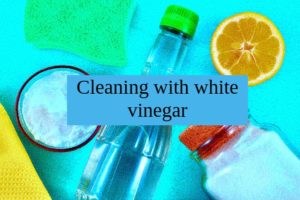 If you recently got into green cleaning, you probably noticed it is one of the key ingredients in most homemade cleaning product recipes. That is mainly because it is 100% natural, eco-friendly, biodegradable, and non-toxic for humans or pets. However, there are a lot of things you should know about vinegar before you start using it. In this article, we will give you more information about the eco-friendly cleaning properties of vinegar, how to use it, whether it is safe for the environment, and where to use and not to use it when it comes to home cleaning.
If you recently got into green cleaning, you probably noticed it is one of the key ingredients in most homemade cleaning product recipes. That is mainly because it is 100% natural, eco-friendly, biodegradable, and non-toxic for humans or pets. However, there are a lot of things you should know about vinegar before you start using it. In this article, we will give you more information about the eco-friendly cleaning properties of vinegar, how to use it, whether it is safe for the environment, and where to use and not to use it when it comes to home cleaning.
We will answer a lot of questions that you may need the answers to. Keep reading to find out what they are.
How is white vinegar made?
Vinegar is typically made in a simple two-step fermentation process. Sugar is converted into alcohol first, then the alcohol is fermented into acetic acid. The carbohydrate used for white vinegar can be corn, rice, or sugar.
Does vinegar have a carbon footprint?
Like most things nowadays, vinegar also has a carbon footprint, even though it is all-natural and eco-friendly. The reason for that is that it is mostly made from water so there is a carbon cost of transportation of a heavy product that contains a lot of water.
However, compared to store-bought products, vinegar contains no harsh or toxic chemicals and is much more cost-effective. What is more, you can buy vinegar in bulk and reduce plastic waste.
Is vinegar safe for the environment?
White vinegar is 100% natural and biodegradable. It is also edible and is considered an eco-friendly cleaning product. What is more, unlike bleach-based commercial products, vinegar is safe to use in septic tanks.
What can you clean with white vinegar?
The acidic nature of vinegar makes it perfect for cleaning a lot of the things at home. It is perfect for removing grease, dirt, and grime in the kitchen, bathroom, and even garden.
An amazing property of white vinegar is that it can act as a disinfectant and kill common germs like salmonella and E.coli. It is great for cleaning cutting boards used for raw meat. You can use it for multiple surfaces, as a softener for your clothes, and to even clean mineral and hard water deposits from windows and glass. If you have mouldy areas or pieces at home, rest assured that vinegar will help kill all the mould and mildew bacteria.
What should you NOT clean with vinegar?
We already mentioned the benefits of the acidic nature of vinegar. However, it also has its downsides. You should never attempt cleaning natural stone with vinegar. The acid in the product will damage and etch the stone. That goes for marble, granite, quartz, or similar. Another no-no combination is vinegar and metallic paint. Do not attempt to clean your car with vinegar. Back in the day when acid rains were a thing, a common issue was damage to paintwork on cars.
Things you should not mix with vinegar
Vinegar is a powerful ingredient and even though it can be extremely useful for a lot of things around the house, it should not be mixed with certain products. You should make sure you know which those ingredients are because while some combinations may simply cause the solution to be neutral and lose all its cleaning properties, other ones may be seriously harmful to human health. Those are:
Bleach – a hazardous and dangerous combination. When mixed, they release a toxic gas that may harm your eyes, throat, and nose. When exposed to the gas for longer, you may experience liquid in your lungs and even death. Never mix those two.
Hydrogen Peroxide – another dangerous combination. When mixed vinegar and hydrogen peroxide create peracetic acid. This is a corrosive acid that will severely harm your eyes, nose, throat, skin, and lungs. Avoid this combination.
Liquid Castile soap – This is a non-toxic combination. However, the acidic nature of the vinegar will cause the Castile soap to separate into its raw ingredients and become oily. You will also notice a white film that is extremely hard to remove.
Baking soda – Another non-toxic combination. If you remember from school experiments, the acidic nature of vinegar and the alkaline baking soda react and create a neutral product that unfortunately has no cleaning abilities.
Borax and washing soda – Both of those products mixed with vinegar will not be harmful to you, but will also create a neutral product that will not help you with the cleaning of your place. Simply spare yourself the time and avoid mixing them.
Why white vinegar?
There are many other types of vinegar, however, white vinegar seems to be the best when it comes to cleaning. White wine vinegar and apple vinegar are not cost-effective when bought in big quantities and used for cleaning. Malt vinegar is darker and may, in fact, stain any fabrics or surfaces that are being cleaned with it.
